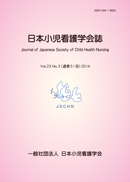Volume 27
Displaying 1-23 of 23 articles from this issue
- |<
- <
- 1
- >
- >|
Research
-
2018 Volume 27 Pages 1-8
Published: 2018
Released on J-STAGE: March 31, 2018
Download PDF (782K) -
2018 Volume 27 Pages 9-17
Published: 2018
Released on J-STAGE: March 31, 2018
Download PDF (879K) -
2018 Volume 27 Pages 18-26
Published: 2018
Released on J-STAGE: March 31, 2018
Download PDF (931K) -
2018 Volume 27 Pages 27-35
Published: 2018
Released on J-STAGE: March 31, 2018
Download PDF (780K) -
2018 Volume 27 Pages 49-56
Published: 2018
Released on J-STAGE: July 31, 2018
Download PDF (753K) -
2018 Volume 27 Pages 57-64
Published: 2018
Released on J-STAGE: July 31, 2018
Download PDF (702K) -
2018 Volume 27 Pages 65-72
Published: 2018
Released on J-STAGE: July 31, 2018
Download PDF (787K) -
2018 Volume 27 Pages 73-82
Published: 2018
Released on J-STAGE: July 31, 2018
Download PDF (906K) -
2018 Volume 27 Pages 97-105
Published: 2018
Released on J-STAGE: November 30, 2018
Download PDF (842K) -
2018 Volume 27 Pages 106-113
Published: 2018
Released on J-STAGE: November 30, 2018
Download PDF (843K) -
2018 Volume 27 Pages 114-121
Published: 2018
Released on J-STAGE: November 30, 2018
Download PDF (817K) -
2018 Volume 27 Pages 122-130
Published: 2018
Released on J-STAGE: November 30, 2018
Download PDF (819K) -
2018 Volume 27 Pages 131-139
Published: 2018
Released on J-STAGE: November 30, 2018
Download PDF (742K) -
2018 Volume 27 Pages 140-148
Published: 2018
Released on J-STAGE: November 30, 2018
Download PDF (823K) -
2018 Volume 27 Pages 149-156
Published: 2018
Released on J-STAGE: November 30, 2018
Download PDF (840K)
Research Report
-
2018 Volume 27 Pages 83-90
Published: 2018
Released on J-STAGE: July 31, 2018
Download PDF (663K)
Material
-
2018 Volume 27 Pages 36-42
Published: 2018
Released on J-STAGE: March 31, 2018
Download PDF (746K) -
2018 Volume 27 Pages 43-48
Published: 2018
Released on J-STAGE: March 31, 2018
Download PDF (660K) -
2018 Volume 27 Pages 91-96
Published: 2018
Released on J-STAGE: July 31, 2018
Download PDF (740K) -
2018 Volume 27 Pages 157-164
Published: 2018
Released on J-STAGE: November 30, 2018
Download PDF (589K) -
2018 Volume 27 Pages 165-170
Published: 2018
Released on J-STAGE: November 30, 2018
Download PDF (729K) -
2018 Volume 27 Pages 171-177
Published: 2018
Released on J-STAGE: November 30, 2018
Download PDF (760K) -
2018 Volume 27 Pages 178-185
Published: 2018
Released on J-STAGE: November 30, 2018
Download PDF (863K)
- |<
- <
- 1
- >
- >|
